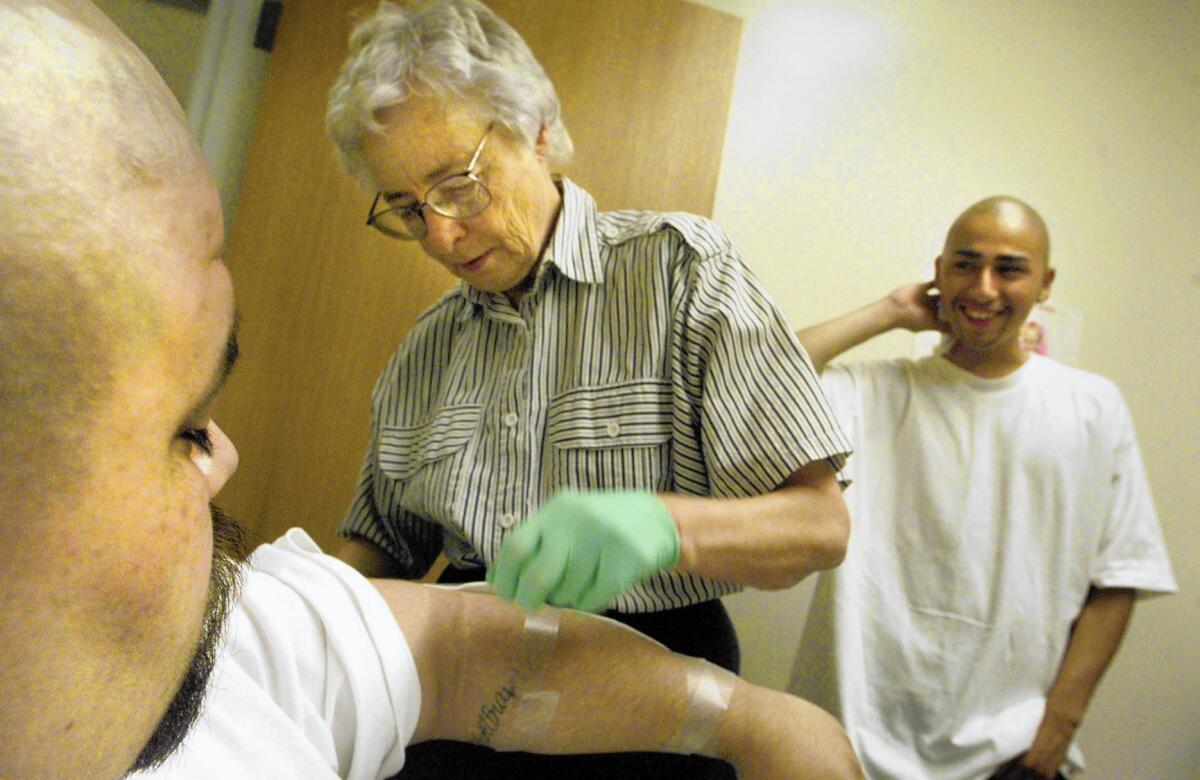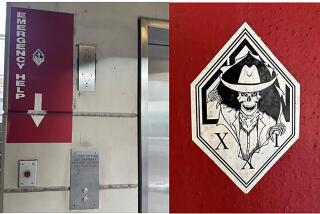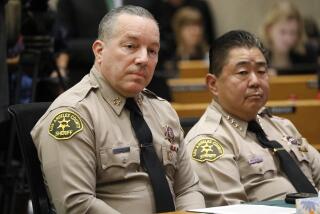June Wilkerson dies at 91; nun helped hundreds erase their gang ties

Sister June Wilkerson, a Catholic nun who organized a tattoo removal program that helped hundreds of San Fernando Valley residents shed their gang affiliations, has died. She was 91.
Wilkerson died Tuesday at a skilled nursing care facility run in Wisconsin by her religious order, the Sinsinawa Dominican Sisters. She was a member of the order for 67 years.
Wilkerson had no particular knowledge of gangs, tattoos or the medical community before being summoned to California in the early 1990s.
Sister Colleen Settles was starting a parish nurse program at Providence Holy Cross Medical Center in Mission Hills. Wilkerson, her old friend, was in Dubuque, Iowa, recuperating from a motorcycle wreck in Bolivia.
“I told her I needed her community organizing skills in California, and she came hobbling in on crutches,” Settles said Wednesday.
After heart surgery, Wilkerson retired. But when the Rodney King riots ignited Los Angeles in 1992, she went back to work, helping to organize programs that put volunteer chaplains on the street during emergencies.
Urged on by pastors and Los Angeles Police Department Sgt. Belinda Robinson, she started her tattoo removal program in 1998. She rounded up volunteer physicians and nurses, raised funds from philanthropic organizations for expensive laser equipment and arranged with schools and businesses for patients to put in hours of community service as partial payment for their treatments.
“She’s making tattoo removal possible for people with no money to spare,” the National Catholic Reporter wrote in 2001. “These are people whose tattoos get in the way of employment, of relationships, of life itself. In extreme cases, they are tattoos that inspire hatred, sometimes enough to kill.”
In 2000, she introduced a Times reporter to an 18-year-old with a fading tattoo on his neck. Just a few months before, he had been stabbed at a bus stop in Van Nuys.
“I didn’t even know the people,” he said. “They knew me by my tattoo.”
By 2009, the program had offered more than 12,000 individual treatments. Each tattoo required multiple sessions, for which private dermatologists would have charged thousands of dollars.
In 2003, Wilkerson told the Atlanta Journal-Constitution that 81% of her “graduates” went on to find jobs.
“One kid came in with a tattoo that said, ‘Marie, my true love,’” she recalled. “He said, ‘Could you just take off ‘Marie’?”
Born in St. Louis on June 8, 1924, Wilkerson was the daughter of a pharmacist and a registered nurse. Her twin brother, Msgr. Jerome Wilkerson, joined the priesthood. He died in 2013.
June Wilkerson was not attracted to the religious life when she was growing up. She later told an interviewer she found the idea of it “fairly dowdy.”
But after reading an article about street preaching, she joined her order — which, by then, had given up its yearlong street preaching experiment.
For 25 years, Wilkerson taught at Catholic high schools. In Alabama during the civil rights era, her passion for social justice took flight. She worked for Catholic Charities in Minneapolis. At a parish in South Bend, Ind., she became active in the Sanctuary movement for refugees from Central America.
Her trip to Bolivia was one of many she made to immerse herself in Spanish. She also took seminarians to Latin America as part of their training in social issues.
She was best known, however, for her Los Angeles tattoo clinic and the personal transformations it enabled.
In a waiting room at the clinic, she saw two young men huddled over coffee — one with a big P, for Pacoima, on his neck and the other with SF for San Fernando.
“Out on the streets, the Pacoimas and the San Fernandos are killing each other,” she told the National Catholic Register. “Here they were talking, having coffee together. I loved that.”
Wilkerson, who is survived by her brother Jack, lived in Santa Clarita until her health started to decline.
More to Read
Start your day right
Sign up for Essential California for the L.A. Times biggest news, features and recommendations in your inbox six days a week.
You may occasionally receive promotional content from the Los Angeles Times.







